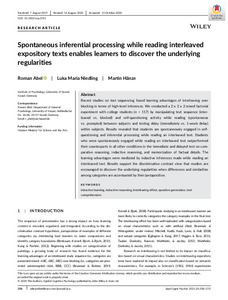Spontaneous inferential processing while reading interleaved expository texts enables learners to discover the underlying regularities
| dc.date.accessioned | 2021-01-22T12:45:57Z | |
| dc.date.available | 2021-01-22T12:45:57Z | |
| dc.date.issued | 2020-11-05 | |
| dc.identifier | doi:10.17170/kobra-202101213014 | |
| dc.identifier.uri | http://hdl.handle.net/123456789/12435 | |
| dc.description.sponsorship | Gefördert im Rahmen des Projekts DEAL | ger |
| dc.language.iso | eng | eng |
| dc.rights | Namensnennung 4.0 International | * |
| dc.rights.uri | http://creativecommons.org/licenses/by/4.0/ | * |
| dc.subject | inductive learning | eng |
| dc.subject | inductive reasoning | eng |
| dc.subject | interleaving effect | eng |
| dc.subject | question generation | eng |
| dc.subject | text comprehension | eng |
| dc.subject.ddc | 150 | |
| dc.title | Spontaneous inferential processing while reading interleaved expository texts enables learners to discover the underlying regularities | eng |
| dc.type | Aufsatz | |
| dcterms.abstract | Recent studies on text sequencing found learning advantages of interleaving over blocking in terms of high‐level inferences. We conducted a 2 × 2 × 2 mixed factorial experiment with college students (n = 117) by manipulating text sequence (interleaved vs. blocked) and self‐questioning activity while reading (spontaneous vs. prompted) between subjects and testing delay (immediately vs. 1‐week delay) within subjects. Results revealed that students are spontaneously engaged in self‐questioning and inferential processing while reading an interleaved text. Students who were spontaneously engaged while reading an interleaved text outperformed their counterparts in all other conditions in the immediate and delayed test on comparative reasoning, inductive reasoning, and memorization of factual details. The learning advantages were mediated by inductive inferences made while reading an interleaved text. Results support the discriminative contrast view that readers are encouraged to discover the underlying regularities when differences and similarities among categories are accentuated by their juxtaposition. | eng |
| dcterms.accessRights | open access | |
| dcterms.creator | Abel, Roman | |
| dcterms.creator | Niedling, Luka Maria | |
| dcterms.creator | Hänze, Martin | |
| dc.relation.doi | doi:10.1002/acp.3761 | |
| dc.subject.swd | Induktion | ger |
| dc.subject.swd | Lernen | ger |
| dc.subject.swd | Denken | ger |
| dc.subject.swd | Interleaving | ger |
| dc.subject.swd | Textverstehen | ger |
| dc.type.version | publishedVersion | |
| dcterms.source.identifier | EISSN 1099-0720 | |
| dcterms.source.issue | Issue 1 | |
| dcterms.source.journal | Applied cognitive psychology | eng |
| dcterms.source.pageinfo | 258-273 | |
| dcterms.source.volume | Volume 35 | |
| kup.iskup | false |
Dateien zu dieser Ressource
Das Dokument erscheint in:
-
Artikel [1169]


